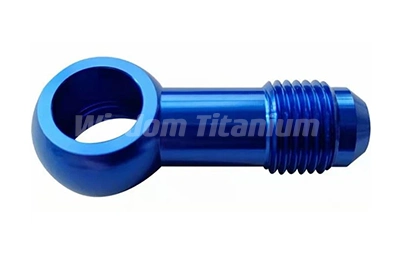
When it comes to high-performance automotive components, the titanium banjo adapter stands out as a crucial element in fluid transfer systems. But what makes these adapters truly exceptional? The answer lies in the meticulous process of heat treatment. In this article, we'll explore why heat treatment is essential for enhancing the durability and performance of titanium banjo adapters, focusing on three key aspects: improved strength, dimensional stability, and hydrogen embrittlement prevention.
Improved Strength
Heat treatment is a game-changer when it comes to boosting the strength of titanium banjo adapters. This process involves carefully heating the titanium to specific temperatures and then cooling it under controlled conditions. The result? A significant enhancement in the material's mechanical properties.
During heat treatment, the titanium's crystalline structure undergoes transformation. This restructuring leads to an increase in both yield strength and ultimate tensile strength. For titanium banjo adapters, this means they can withstand higher pressures and more severe operating conditions without failing. The improved strength also contributes to the adapter's longevity, reducing the likelihood of premature wear or failure.
Moreover, heat treatment can optimize the balance between strength and ductility. This is particularly important for titanium banjo adapters, as they need to be strong enough to resist pressure but also ductile enough to withstand vibrations and minor impacts without cracking. The right heat treatment process can achieve this delicate balance, resulting in a more robust and reliable component.
It's worth noting that the specific heat treatment parameters can be tailored to meet the unique requirements of different applications. For instance, a titanium banjo adapter used in a high-performance racing car might undergo a different heat treatment process compared to one used in a standard passenger vehicle, ensuring optimal performance in each context.
Dimensional Stability
One of the most significant advantages of heat treatment for titanium banjo adapters is the enhancement of dimensional stability. In precision engineering, maintaining exact dimensions is critical; even minor deviations can lead to serious performance issues or component failures. Therefore, the role of heat treatment in minimizing these risks cannot be overstated.
Throughout the manufacturing process, titanium components may develop internal stresses due to various operations such as machining, forming, or welding. These stresses can remain trapped within the material, potentially leading to warping or shape alterations over time. This issue is particularly concerning when components are subjected to high temperatures or pressures during their operational life. If left unaddressed, these internal stresses can compromise the integrity and functionality of the titanium banjo adapter.
Heat treatment, specifically stress relief annealing, is an effective method for eliminating these internal stresses. By subjecting the titanium banjo adapter to precisely controlled heating and cooling cycles, manufacturers can effectively relieve these stresses without significantly altering the material's microstructure. This careful process ensures that the adapter retains its intended dimensions and shape, which is vital for consistent performance, particularly in high-stakes applications.
The enhancement of dimensional stability through heat treatment also has a direct impact on its sealing properties. These adapters frequently interface with other components in fluid transfer systems, where maintaining exact dimensions is essential to prevent leaks. Heat-treated adapters are less prone to warping or distortion, which guarantees a tight and reliable seal throughout the component's operational lifespan.
In conclusion, the dimensional stability afforded by heat treatment not only ensures the precise performance of titanium banjo adapters but also enhances their reliability in critical applications. By effectively managing internal stresses, manufacturers can produce components that meet stringent performance requirements, ultimately contributing to the overall success and safety of the systems in which they are utilized.
Hydrogen Embrittlement Prevention
One of the lesser-known but critically important benefits of heat treatment for titanium banjo adapters is the prevention of hydrogen embrittlement. Titanium, despite its many advantages, is susceptible to hydrogen embrittlement – a process where hydrogen atoms diffuse into the metal, leading to a loss of ductility and tensile strength.
Hydrogen can be introduced into titanium during various manufacturing processes, including cleaning, pickling, or electroplating. It can also be absorbed from the environment during service, especially in applications involving hydrogen-rich atmospheres or electrolytes. The presence of hydrogen in titanium can lead to sudden, unexpected failures, which is particularly dangerous in high-pressure fluid systems where titanium banjo adapters are often used.
Heat treatment, specifically a process known as hydrogen annealing or degassing, can effectively mitigate this risk. By heating the titanium banjo adapter to specific temperatures in a controlled atmosphere, manufacturers can drive out dissolved hydrogen from the metal. This process not only removes existing hydrogen but also creates a protective oxide layer on the surface, which helps prevent future hydrogen absorption.
For titanium banjo adapters used in critical applications, such as aerospace or high-performance automotive systems, this hydrogen embrittlement prevention is crucial. It ensures the long-term reliability and safety of the component, even in challenging operating environments.
Conclusion
The importance of heat treatment in enhancing the durability of titanium banjo adapters cannot be overstated. Through improved strength, dimensional stability, and hydrogen embrittlement prevention, heat treatment transforms an already exceptional material into a component that can withstand the most demanding applications.
For manufacturers and users of titanium banjo adapters, understanding the significance of heat treatment is crucial. It's not just about meeting specifications; it's about ensuring safety, reliability, and optimal performance over the long term. As technology continues to advance, we can expect even more refined heat treatment processes that will further enhance the capabilities of titanium components.
If you're in the market for high-quality titanium banjo adapters, look for manufacturers who prioritize proper heat treatment in their production process. Wisdom Titanium, an ISO 9001-certified manufacturer founded in 2013, specializes in producing standard and customized CNC parts. For more information or to discuss your specific needs, don't hesitate to reach out to their team at sales@wisdomtitanium.com.
References
1.Lutjering, G., & Williams, J. C. (2007). Titanium. Springer Science & Business Media.
2.Donachie, M. J. (2000). Titanium: A Technical Guide. ASM International.
3.Froes, F. H. (Ed.). (2015). Titanium: Physical Metallurgy, Processing, and Applications. ASM International.





